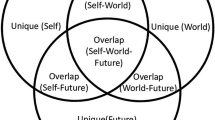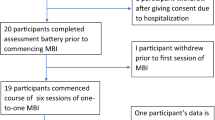Abstract
Mindfulness-Based Cognitive Therapy (MBCT) is a promising intervention to prevent depressive relapse. Yet beyond efficacy studies, little is known regarding the mechanisms that could be modified through MBCT. Objectives of the present study were twofold: determine whether cognitive functioning was altered among patients remitted from depression at admission in a MBCT trial; and document possible changes during the trial and follow-up. In a cross-sectional perspective, cognitive functioning (autobiographical memory, shifting capacities, dysfunctional attitudes, mindful attention awareness and rumination habits) was first compared between 36 patients remitted from depression, 20 acutely depressed patients and 20 control participants. In a longitudinal perspective, changes in the remitted sample were explored during a MBCT plus Treatment As Usual versus Treatment As Usual randomized controlled trial and 9-month follow-up. Performances of remitted patients were similar to the ones of control participants for autobiographical memories, shifting capacities, and mindful attention awareness, whereas levels of rumination and dysfunctional attitudes were significantly elevated. Participation in the MBCT program was accompanied with a significant decrease of dysfunctional attitudes that continued up to 9-month postintervention. No other change was observed that was specific to MBCT. Results suggest that MBCT might help people to identify dysfunctional attitudes at a very early stage and to avoid engaging further in these attitudes.
Similar content being viewed by others
References
American Psychiatric Association. (1994). Diagnostic and statistical manual of mental disorders: DSM-IV (4th ed.). Washington: American Psychiatric Association.
Anderson, N. D., Lau, M. A., Segal, Z. V., & Bishop, S. R. (2007). Mindfulness-based stress reduction and attentional control. Clinical Psychology and Psychotherapy, 14(6), 449–463. doi:10.1002/cpp.544.
Beck, A. T. (1967). Depression: causes and treatment. Philadelphia: University of Pennsylvania Press.
Beck, A. T., Steer, R. A., & Brown, G. K. (1996). Manual for the Beck Depression Inventory-II. San Antonio: Psychological Corporation.
Beck, A. T., Steer, R. A., & Brown, G. K. (1998). BDI -II, Inventaire de dépression de Beck. Paris: Ed. du Centre de Psychologie Appliquée.
Beevers, C. G., & Miller, I. W. (2004). Perfectionism, cognitive bias, and hopelessness as prospective predictors of suicidal ideation. Suicide and Life-threatening Behavior, 34(2), 126–137. doi:10.1521/suli.34.2.126.32791.
Bishop, S. R., Lau, M. A., Shapiro, S., Carlson, L., Anderson, N. D., Carmody, J., et al. (2004). Mindfulness: A proposed operational definition. Clinical Psychology: Science and Practice, 11(3), 230–241. doi:10.1093/clipsy.bph077.
Bondolfi, G., Jermann, F., Van der Linden, M., Gex-Fabry, M., Bizzini, L., Weber-Rouget, B., et al. (2010). Depression relapse prophylaxis with mindfulness-based cognitive therapy: Replication and extension in the Swiss health care system. Journal of Affective Disorders, 122(3), 224–231. doi:10.1016/j.jad.2009.07.007.
Bostanov, V., Keune, P. M., Kotchoubey, B., & Hautzinger, M. (2012). Event-related brain potentials reflect increased concentration ability after mindfulness-based cognitive therapy for depression: a randomized clinical trial. Psychiatry Research, 199(3), 174–180. doi:10.1016/j.psychres.2012.05.031.
Bouvard, M., Cottraux, J., Charles, S., Ciadella, P., Guerin, J., & Aimard, G. (1994). Etude de validation sur une population française de l’échelle d’attitudes dysfonctionnelles de Weissman et Beck (DAS forme A). Journal de Thérapie Comportementale et Cognitive, 4(4), 127–135.
Brown, K. W., & Ryan, R. M. (2003). The benefits of being present: mindfulness and its role in psychological well-being. Journal of Personality and Social Psychology, 84(4), 822–848.
Chambers, R., Lo, B., & Allen, N. B. (2008). The impact of intensive mindfulness training on attentional control, cognitive style, and affect. Cognitive Therapy and Research, 32(3), 303–322. doi:10.1007/s10608-007-9119-0.
Chiesa, A., & Serretti, A. (2011). Mindfulness based cognitive therapy for psychiatric disorders: A systematic review and meta-analysis. Psychiatry Research, 187(3), 441–453. doi:10.1016/j.psychres.2010.08.011.
Chiesa, A., Calati, R., & Serretti, A. (2011). Does mindfulness training improve cognitive abilities? A systematic review of neuropsychological findings. Clinical Psycholy Review, 31(3), 449–464. doi:10.1016/j.cpr.2010.11.003.
First, M. B., Spitzer, R. L., Gibbon, M., & Williams, J. B. W. (1996). Structured clinical interview for DSM-IV Axis I disorders - Patient edition (SCID-I/P, Version 2.0). New York: New york State Psychiatric Institute, Biometrics Research Department.
Godfrin, K. A., & van Heeringen, C. (2010). The effects of mindfulness-based cognitive therapy on recurrence of depressive episodes, mental health and quality of life: A randomized controlled study. Behaviour Research and Therapy, 48(8), 738–746. doi:10.1016/j.brat.2010.04.006.
Grossman, P. (2011). Defining mindfulness by how poorly I think I pay attention during everyday awareness and other intractable problems for psychology’s (re)invention of mindfulness: comment on Brown et al. (2011). Psychological Assessment, 23(4), 1034-1040; discussion 1041-1036. doi: 10.1037/a0022713.
Grossman, P., Nieman, L., Schmidt, S., & Walach, H. (2004). Mindfulness-based stress reduction and health benefits. A meta-analysis. Journal of Psychosomatic Research, 57, 35–43. doi:10.1016/S0022-3999(03)00573-7.
Hargus, E., Crane, C., Barnhofer, T., & Williams, J. M. G. (2010). Effects of mindfulness on meta-awareness and specificity of describing prodromal symptoms in suicidal depression. Emotion, 10(1), 34–42. doi:10.1037/a0016825.
Heeren, A., Van Broeck, N., & Philippot, P. (2009). The effects of mindfulness on executive processes and autobiographical memory specificity. Behaviour Research Therapy, 47(5), 403–409. doi:10.1016/j.brat.2009.01.017.
Hofmann, S. G., Sawyer, A. T., Witt, A. A., & Oh, D. (2010). The effect of mindfulness-based therapy on anxiety and depression: A meta-analytic review. Journal of Consulting and Clinical Psychology, 78(2), 169–183. doi:10.1037/a0018555.
Hölzel, B. K., Lazar, S. W., Gard, T., Schuman-Olivier, Z., Vago, D. R., & Ott, U. (2011). How does mindfulness meditation work? Proposing mechanisms of action from a conceptual and neural perspective. Perspectives on Psychological Science, 6(6), 537–559. doi:10.1177/1745691611419671.
Ingram, R. E., Miranda, J., & Segal, Z. V. (1998). Cognitive vulnerability to depression. New York: Guilford Press.
Jermann, F., Billieux, J., Larøi, F., d’Argembeau, A., Bondolfi, G., Zermatten, A., et al. (2009). Mindful attention awareness scale (MAAS): Psychometric properties of the French translation and exploration of its relations with emotion regulation strategies. Psychological Assessment, 21(4), 506–514. doi:10.1037/a0017032.
Jermann, F., Billieux, J., Bizzini, L., Van der Linden, M., & Bondolfi, G. (2010). Rumination-Reflection Questionnaire (RRQ) : Psychometric properties of the French translation and exploration of the relationships between the RRQ and depressive symptoms and mindfulness. Paper presented at the VI World Congress of Behavioural and Cognitive Therapies (WCBCT), Boston.
Jersild, A. T. (1927). Mental set and shift. Archives of Psychology, 14, 89.
Kessing, L. V. (1998). Cognitive impairment in the euthymic phase of affective disorder. Psychological Medicine, 28(5), 1027–1038.
Kuyken, W., Byford, S., Taylor, R. S., Watkins, E., Holden, E., White, K., et al. (2008). Mindfulness-based cognitive therapy to prevent relapse in recurrent depression. Journal of Consulting and Clinical Psychology, 76(6), 966–978. doi:10.1037/a0013786.
Ma, S. H., & Teasdale, J. D. (2004). Mindfulness-based cognitive therapy for depression: Replication and exploration of differential relapse prevention effects. Journal of Consulting and Clinical Psychology, 72(1), 31–40. doi:10.1037/0022-006X.72.1.31.
Mathews, A., & MacLeod, C. (2005). Cognitive vulnerability to emotional disorders. Annual Review of Clinical Psychology, 1, 167–195. doi:10.1146/annurev.clinpsy.1.102803.143916.
Michalak, J., Heidenreich, T., Meibert, P., & Schulte, D. (2008). Mindfulness predicts relapse/recurrence in major depressive disorder after mindfulness-based cognitive therapy. Journal of Nervous and Mental Disease, 196(8), 630–633. doi:10.1097/NMD.0b013e31817d0546.
Miyake, A., Friedman, N. P., Emerson, M. J., Witzki, A. H., Howerter, A., & Wager, T. D. (2000). The unity and diversity of executive functions and their contributions to complex “Frontal Lobe” tasks: A latent variable analysis. Cognitive Psychology, 41(1), 49–100. doi:10.1006/cogp.1999.0734.
Montgomery, S. A., & Asberg, M. (1979). A new depression scale designed to be sensitive to change. The British Journal of Psychiatry, 134, 382–389.
Montgomery, C., Fisk, J. E., Newcombe, R., & Murphy, P. N. (2005). The differential effects of ecstasy/polydrug use on executive components: shifting, inhibition, updating and access to semantic memory. Psychopharmacology (Berl), 182(2), 262–276. doi:10.1007/s00213-005-0065-9.
Murphy, F. C., Sahakian, B. J., Rubinsztein, J. S., Michael, A., Rogers, R. D., Robbins, T. W., et al. (1999). Emotional bias and inhibitory control processes in mania and depression. Psychological Medicine, 29(6), 1307–1321.
Nolen-Hoeksema, S. (1991). Responses to depression and their effects on the duration of depressive episodes. Journal of Abnormal Psychology, 100(4), 569–582.
Pellet, J., Bobon, D. P., Mormont, I., Lang, F., & Massardier, A. (1980). Etude de princeps de validation française de la MADRS, sous-échelle Dépression de la CPRS Comptes-rendus du Congrès de psychiatrie et de neurologie de langue française Reims, 25–28 juin. Paris: Masson.
Peselow, E. D., Robins, C., Block, P., & Barouche, F. (1990). Dysfunctional attitudes in depressed patients before and after clinical treatment and in normal control subjects. The American Journal of Psychiatry, 147(4), 439–444.
Ramel, W., Goldin, P. R., Carmona, P. E., & McQuaid, J. R. (2004). The effects of mindfulness meditation on cognitive processes and affect in patients with past depression. Cognitive Therapy and Research, 28(4), 433–455. doi:10.1023/B:COTR.0000045557.15923.96.
Segal, Z. V., Teasdale, J. D., Williams, J. M. G., & Gemar, M. C. (2002a). The mindfulness-based cognitive therapy adherence scale: Inter-rater reliability, adherence to protocol and treatment distinctiveness. Clinical Psychology and Psychotherapy, 9, 131–138. doi:10.1002/cpp.320.
Segal, Z. V., Williams, J. M. G., & Teasdale, J. D. (2002b). Mindfulness-based cognitive therapy for depression: a new approach to preventing relapse. New York: Guilford Press.
Segal, Z. V., Kennedy, S., Gemar, M., Hood, K., Pedersen, R., & Buis, T. (2006). Cognitive reactivity to sad mood provocation and the prediction of depressive relapse. Archives of General Psychiatry, 63(7), 749–755. doi:10.1001/archpsyc.63.7.749.
Segal, Z. V., Bieling, P., Young, T., MacQueen, G., Cooke, R., Martin, L., et al. (2010). Antidepressant monotherapy vs sequential pharmacotherapy and mindfulness-based cognitive therapy, or placebo, for relapse prophylaxis in recurrent depression. Archives of General Psychiatry, 67(12), 1256–1264. doi:10.1001/archgenpsychiatry.2010.168.
Spector, A., & Biederman, I. (1976). Mental set and mental shift revisited. The American Journal of Psychology, 89(4), 669–679. doi:10.2307/1421465.
Teasdale, J. D. (1988). Cognitive vulnerability to persistent depression. Cognition and Emotion, 2(3), 247–274. doi:10.1080/02699938808410927.
Teasdale, J. D., Segal, Z. V., Williams, J. M. G., Ridgeway, V. A., Soulsby, J. M., & Lau, M. A. (2000). Prevention of relapse/recurrence in major depression by mindfulness-based cognitive therapy. Journal of Consulting and Clinical Psychology, 68(4), 615–623. doi:10.1037/0022-006X.68.4.615.
Trapnell, P. D., & Campbell, J. D. (1999). Private self-consciousness and the five-factor model of personality: Distinguishing rumination from reflection. Journal of Personality and Social Psychology, 76(2), 284–304. doi:10.1037/0022-3514.76.2.284.
Weissman, A. N., & Beck, A. T. (1978). Development and validation of the dysfunction attitude scale: A preliminary investigation. Toronto: Paper presented at the Proceedings of the meeting of the American Education Research Association.
Williams, J. M. G., & Broadbent, K. (1986). Autobiographical memory in suicide attempters. Journal of Abnormal Psychology, 95(2), 144–149. doi:10.1037/0021-843X.95.2.144.
Williams, J. M. G., Teasdale, J. D., Segal, Z. V., & Soulsby, J. (2000). Mindfulness-based cognitive therapy reduces overgeneral autobiographical memory in formerly depressed patients. Journal of Abnormal Psychology, 109(1), 150–155. doi:10.1037/0021-843X.109.1.150.
Williams, J. M. G., Barnhofer, T., Crane, C., Herman, D., Raes, F., Watkins, E., et al. (2007). Autobiographical memory specificity and emotional disorder. Psychological Bulletin, 133(1), 122–148. doi:10.1037/0033-2909.133.1.122.
Zimmerman, M., Posternak, M. A., & Chelminski, I. (2004). Defining remission on the Montgomery-Asberg depression rating scale. The Journal of Clinical Psychiatry, 65(2), 163–168. doi:10.4088/JCP.v65n0204.
Zuroff, D. C., Blatt, S. J., Sanislow, C. A, I. I. I., Bondi, C. M., & Pilkonis, P. A. (1999). Vulnerability to depression: Reexamining state dependence and relative stability. Journal of Abnormal Psychology, 108(1), 76–89. doi:10.1037/0021-843x.108.1.76.
Acknowledgments
This study was supported by a grant from the Swiss National Science Foundation (Grant no. 3200BO-108432 to Guido Bondolfi, Gilles Bertschy, Jean-Michel Aubry and Martial Van der Linden). The authors would like to thank the MBCT instructors L. Bizzini, L. Myers Arrazola and B. Weber, as well as C. Gonzalez for her help in data collection. They would also like to thank Sandra Ter Pelle for her expert technical support in preparing this manuscript.
Conflict of interest
There is no conflict of interest in this research.
Author information
Authors and Affiliations
Corresponding author
Rights and permissions
About this article
Cite this article
Jermann, F., Van der Linden, M., Gex-Fabry, M. et al. Cognitive Functioning in Patients Remitted from Recurrent Depression: Comparison with Acutely Depressed Patients and Controls and Follow-up of a Mindfulness-Based Cognitive Therapy Trial. Cogn Ther Res 37, 1004–1014 (2013). https://doi.org/10.1007/s10608-013-9544-1
Published:
Issue Date:
DOI: https://doi.org/10.1007/s10608-013-9544-1




